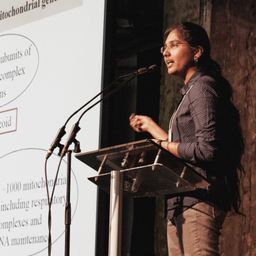Targeting adipogenesis with green tea derived catechins: An impact on the paracrine regulation of triple-negative breast cancer progression
My Session Status
Targeting adipogenesis with green tea derived catechins: An impact on the paracrine regulation of triple-negative breast cancer progression
Narjara González Suárez and Borhane Annabi
UQAM
BACKGROUND: Obese subjects have an increased risk of developing triple-negative breast cancer (TNBC), in part associated with the chronic low-grade inflammation state. On the other hand, epidemiological data indicates that increased consumption of polyphenol-rich fruits and vegetables plays a key role in reducing incidence of some cancers. OBJECTIVES: Here, we tested whether green tea-derived epigallocatechin-3-gallate (EGCG) could alter adipogenesis processes, and whether pre- and mature adipocytes can regulate TNBC invasive phenotype. METHODS:Pre-adipocyte differentiation was performed and conditioned media (CM) from undifferentiated and mature adipocytes harvested. HumanTNBC-derivedMDA-MB-231 real-time cell migration was performed using the exCELLigence system. Differential gene arrays and RT-qPCR were used to assess gene expression levels. Western blotting was used to assess the protein expression levels. RESULTS: EGCG was found to inhibit adipogenesis by reducing expressions of PPARγ, adiponectin, and C/EBPα. Higher induction of MDA-MB-231 cell migration was seen in response to CM of mature adipocytes, and this was correlated to induction of the STAT-3 signaling pathway. This invasive phenotype was prevented by EGCG, the JAK/STAT inhibitor Tofacitinib, as well as upon STAT-3 gene silencing. CONCLUSION: Factors secreted from mature adipocytes play key roles in the paracrine modulation of TNBC cells invasive phenotype. Dietary interventions may, in part through the demonstrated action of EGCG, prevent the onset of the proinflammatory obesogenic environment that favors cancer development.






